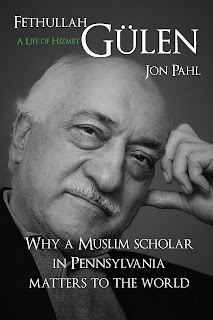Indeed, Fethullah Gulen's story is a distingushably Turkish one, yet not exclusively so. The last 20 years of Gulen's life and Hizmet Movement participants making the US their new home is as American as The Mayflower. Jon Pahl's book, besides its other merits, powerfully captures that dimension and presents it to the American audience. In that sense A Life of Hizmet addresses one of the most understudied compartments of the literature on Gulen himself and the Hizmet Movement. In a more general outloook, the book is "critically sound and politically inspiring" as its author hoped it to be.
One of the main preconditions for a healthy inquiry is ensuring that the tool of analysis matches the nature of the topic at hand. Sadly, a sizeable portion of the early accounts about Gulen failed to satisfy that standard. They rather assumed an oversimplified attitude by narrowing the issue to politics and thus doing a great injustice to social, religious, civic dimensions of his impact. A Life of Hizmet joins the valuable works that illustrate the mutifaceted and nuanced case of Gulen as well as the movement he envisioned.
A Life of Hizmet has a story, from the moment Jon Pahl received an invitation to an iftar organized by Hizmet volunteers all the way to the time it ended up in bookstores. Even that very story is like a microcosm of Hizmet's half-century story itself. To mention one example, the author preferred not to meet Gulen until he had finished the first draft of the book. Consequently, just like the way Gulen keeps a low profile and leaves the agency to his sympathizers, his first authorized biography came to being mostly through the narratives of Hizmet people.
A Life of Hizmet includes a few layers of concurrent stories. As expressed by Pahl, the book aims to describe Hizmet Movement -to its presumably Western reader- particularly with regard to its Islamic and interfaith credentials. In fact, the book is a pretty user friendly introduction to Islam as it familiarizes the reader with key concepts of Islamic history, creed, practice and mysticism as one navigates through Gulen's story. Pahl succintly summarizes a rare blend when he describes Gulen's Sufism as one "in keeping with the orthodox disciplines of Islam, and not some of the more exotic and esoteric practices and doctrines judged by many Muslims to be heretical". In the overall, the book takes its reader into a rich encounter with a contemporary Islamic school of thought that is openly, strongly and proudly anchored in tradition, yet warmly accepting others as they are.
In a similar vein, Pahl's work is an insightful summary of modern Turkey's long and bitter story; namely its torn identity between the East and the West, failure to rehabilitate the trauma of losing an empire, uneasy state-citizen relations, severely compartmentalized social-political spectrum, and century-long uphill battle for democracy that resulted in a huge disappointment under AKP. Such clear background helps reader understand the terrain and put into context key developments in Gulen's life.
A profound contribution of the book is the powerful insights it presents about Gulen's leadership. What we (re)discover through a number of testimonies, anectodes and observations about Gulen is a kind of transformative leadership that empowers those who follow the lead figure. This record about the nature of Gulen's leadership points to a total departure from the role of unquestionable cult leader that empowers himself by posing a saintly status and asserting an exclusive claim to possess the ultimate truth. Unlike a cult structure, the communication moves in both ways between the Gulen and his audience. The way Hizmet functions makes Gulen, put precisely by Pahl, "while still a source of inspiration, in many ways a follower".
A Life of Hizmet is a fruitful harvest of concepts. While being highly readable to the non-academic curiosity, it suggests a set of vocabulary that seem to be instrumental for future work on Gulen and Hizmet. The lexicon such as engaged empathy, principled pluralism, deep peace might not necessarily be totally new in social science literature but they no doubt are well-founded and relevant contributions into the specific compartment of Hizmet studies. Last but surely not least, A Life of Hizmet is a laudable account of how Gulen bridges East and West, tradition and modernity, urban and rural, local and cosmopolitan, faith and reason, state and citizen as well as secular and devout.
Criticism? Well, I would be happy to read if there's any!
Criticism? Well, I would be happy to read if there's any!

Comments
Post a Comment